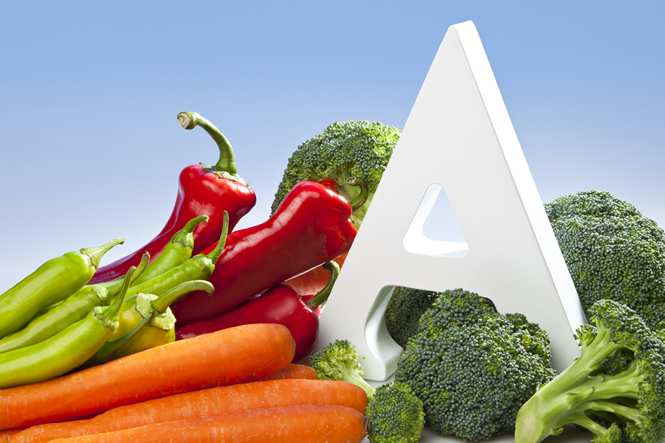Why do we need vitamin A?

A main compound of vitamin A is retinol, which is primarily known for its role in promoting good eye health. This compound helps with low-light and with colour vision by protecting the retina and corneal surface.
In a similar way to how vitamin A protects the eyes, it is also seen to promote healthy skin cells. It encourages immature skin cells to turn to mature cells. It also seems to reduce the size of sebaceous glands and release of sebum, a source of nutrients for bacteria. These actions combined seem to reduce tendency to develop acne, as well as help to develop effective treatments.
Vitamin A is also thought to be important for immune function. It improves the body’s immune defences and helps the body to fight off infections more quickly.
Natural sources of vitamin A
All the vitamin A that we need should be available through our diet. Typically, an adult man requires 900-3000mcg of vitamin A each day, and the average woman needs 700-3000mcg each day. There are two types of this vitamin: preformed vitamin A and provitamin A.
Preformed vitamin A is one of the most active forms of the vitamin and is found in meat, poultry, fish and dairy products. Alpha-carotene, beta-carotene and beta-cryptoxanthin are plant pigments found in fruit and vegetables that the body converts into provitamin A.
Diet is our only natural source of vitamin A, and certain foods are known to be particularly good sources of this vitamin. Preformed vitamins A is highest in liver and fish oils, and provitamin A is found in leafy green vegetables and yellow and orange vegetables.
Typical values of vitamin A in food sources:
| Food source | Vitamin A content (micrograms, mcg) |
| Lamb’s liver, 75g | 5700 |
| Cod’s liver oil, 1 tsp | 1400 |
| Medium sweet potato | 1100 |
| Eel, 75g | 850 |
| Tuna, 75g | 530 |
| Medium carrot | 510 |
| Dried apricots, 115g | 380 |
| Hard goat’s cheese, 50g | 240 |
Vitamin A deficiency
Vitamin A deficiency most commonly affects children, particularly in developing countries. It is one of the most common vitamin deficiencies in the UK diet.
Vitamin A deficiency can be primary of secondary. Primary vitamin A deficiency occurs when not enough vitamin A is being consumed in the diet. Secondary deficiency occurs when the vitamin A being consumed is not being properly absorbed. This can be the result of impaired bile production, or long-term exposure to cigarette smoke or alcohol, for example.
Eye problems are usually the first indication of vitamin A deficiency. Impaired vision and reduced night vision can occur, though this can initially be reversed by restoring adequate levels of vitamin A into the diet. Prolonged deficiency can lead to permanent problems with vision and eventually total blindness. Other problems include reduced immunity, causing increased susceptibility to urinary tract infections, ear infections and weakening of tooth enamel.
Too much vitamin A
Just as too little vitamin A can cause problems, so can absorbing too much. Initially symptoms can include dizziness and nausea, although this can usually be reversed once the level of vitamin A returns to normal.
The body stores any vitamin A that it does not use immediately. It is usually stored in the liver, and if the levels accumulate, can cause poisoning and damage to the liver. Prolonged toxic levels can cause irreversible damage.
Too much vitamin A is found to be a risk for pregnant women, as it can damage the unborn foetus. Pregnant woman should seek advice before taking vitamin A supplements or consuming liver or liver products.





 Looking for our products in a store near you?
Looking for our products in a store near you?
